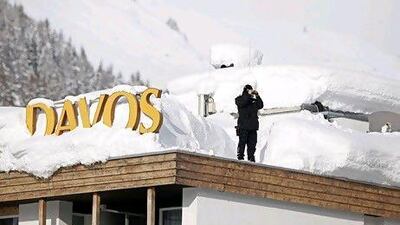The global economy is in for another bumpy ride this year, with even Chinese and Indian business leaders painting a gloomy picture.
Nearly half of the world's leading chief executives polled in a survey by PricewaterhouseCoopers (PwC), highlighted on the eve of the World Economic Forum, believe there will be a further decline in the economic situation in the next 12 months.
Evaporating confidence is particularly marked in China and India, the two powerhouses of the Asian economy, according to the international accounting firm.
Sentiment among Chinese business leaders fell from 72 per cent last year to 51 per cent this year, the poll found, the biggest decline in the Asia Pacific region.
In India, there was also a steep decline in confidence, with only 55 per cent of bosses "very confident" of revenue growth, compared with 88 per cent last year. That slump is India's biggest in six years, PwC reported.
"CEO confidence is decidedly down as they deal with the aftershocks of the recession. They are disappointed with the course of the global economy and the pace of recovery," said Dennis Nally, the chairman of PwC International, at a meeting in the exclusive Steigenberger Grandhotel Bélvèdere in Davos as participants gathered for the business bash in the Swiss ski resort.
"The optimism that had been cautiously building since 2008 has begun to recede.
"The ongoing debt crisis in the European Union, along with other lingering economic uncertainties, have deflated confidence in business growth around the world. Even the fast-growing economies of Asia and Latin America are not immune to the realities of continued economic stagnation, belying the notion that the global economy has decoupled. CEOs all round the world are worried about the health of the global economy."
One bright spot in the gloom detected by PwC was in the Middle East and North Africa (Mena), where more chief executives reported they were going to expand their workforces in the coming year.
Even so, Mr Nally said executives in the Mena region were still worried about the problems of excessive regulation of their businesses, ongoing problems with corruption, and concerns about the availability of talent in local workforces.
"It is ironic that as the economy struggles, shortages of key personnel are having an impact on the way companies do business. CEOs are having difficulties finding and retaining skilled people in their industries and turnover in emerging markets especially is high," he said.
But he also said the wholesale withdrawal of foreign businesses from the Mena region some analysts had expected when the Arab Spring protests began a year ago had "not taken place on the scale some had feared. We simply have not seen it."
In the US, chief executives mirrored the global view and were also cautious. Still, about 41 per cent were upbeat about short-term growth, despite concerns about the US debt ceiling and gridlock in Washington ahead of the presidential elections this autumn.
"It really does suggest that maybe the US economy is better or stronger than what some believe," Mr Nally said, adding US companies had grown used to being patient with policymakers in an election year.
"Europe is really a short-term issue though," he said. "I don't think you have 12 months to keep this debate going on how to deal with the debt crisis."
The PwC survey was conducted among 1,250 chief executives in 60 countries in the last quarter of last year. On the upside to its overall negative tone, Mr Nally said nearly three times as many chief executives were confident for the prospects of their own companies' growth prospects than they were for the global economy, which PwC suggests "CEOs believe they have learnt how to manage through difficult and volatile economic times".
Some 40 per cent believe their own companies will benefit from revenue growth in the coming year, while more than half expect to increase headcount.
twitter: Follow our breaking business news and retweet to your followers. Follow us

